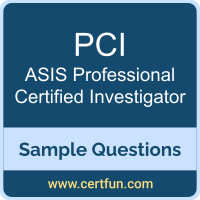 The purpose of this Sample Question Set is to provide you with information about the ASIS Professional Certified Investigator (PCI) exam. These sample questions will make you very familiar with both the type and the difficulty level of the questions on the PCI certification test. To get familiar with real exam environment, we suggest you try our Sample ASIS PCI Certification Practice Exam. This sample practice exam gives you the feeling of reality and is a clue to the questions asked in the actual ASIS Professional Certified Investigator (PCI) certification exam.
The purpose of this Sample Question Set is to provide you with information about the ASIS Professional Certified Investigator (PCI) exam. These sample questions will make you very familiar with both the type and the difficulty level of the questions on the PCI certification test. To get familiar with real exam environment, we suggest you try our Sample ASIS PCI Certification Practice Exam. This sample practice exam gives you the feeling of reality and is a clue to the questions asked in the actual ASIS Professional Certified Investigator (PCI) certification exam.
These sample questions are simple and basic questions that represent likeness to the real ASIS Professional Certified Investigator exam questions. To assess your readiness and performance with real-time scenario based questions, we suggest you prepare with our Premium ASIS PCI Certification Practice Exam. When you solve real time scenario based questions practically, you come across many difficulties that give you an opportunity to improve.
ASIS PCI Sample Questions:
a) serial, motivational, ideological, and fundamental
b) psychological, methodical, punctual, and random
c) economic, egocentric, ideological, and psychotic
d) sensible, formidable, reliable, and economic
a) parallel
b) checkpointing
c) reactive
d) progressive
The reference from the former employer is glowing and was given by the applicant’s former lover and confidant, not by management. The investigator has a nondisclosure agreement with the former employer.
How does the investigator ethically proceed?
a) Provide all information requested to the client.
b) Advise the law firm the investigator has a conflict of interest and cannot take the case.
c) Verbally report to the law firm what the investigator knows and formally decline the case.
d) Advise the law firm of the discrepancy in the application and imply there is negative information available, then formally decline the case.
a) Original ghost payroll checks
b) Dollar amounts of the ghost payroll checks
c) Bank account numbers used to deposit the checks
d) Company payroll records
a) Supporting the posited theory
b) Disproving the allegations
c) Influencing the attitude of the reader
a) Use a write-blocker to prevent modification of original digital data
b) Copy files onto a personal USB drive for easy access
c) Modify metadata to highlight important details
d) Delete irrelevant files before forensic examination
a) Law enforcement-informant
b) Father-son
c) Attorney-client
d) Husband-wife
a) pre-surveillance planning
b) overt surveillance
c) moving surveillance
d) checkpointing
a) Written statements from the suspects
b) Video surveillance evidence
c) Corroborating statement
d) Proof of loss
a) fragmenting
b) segmenting
c) sectoring
d) checkpointing
Answers:
|
Question: 01 Answer: c |
Question: 02 Answer: d |
Question: 03 Answer: b |
Question: 04 Answer: a |
Question: 05 Answer: c |
|
Question: 06 Answer: a |
Question: 07 Answer: b |
Question: 08 Answer: d |
Question: 09 Answer: c |
Question: 10 Answer: d |
Note: For any error in ASIS Professional Certified Investigator (PCI) certification exam sample questions, please update us by writing an email on feedback@certfun.com.
